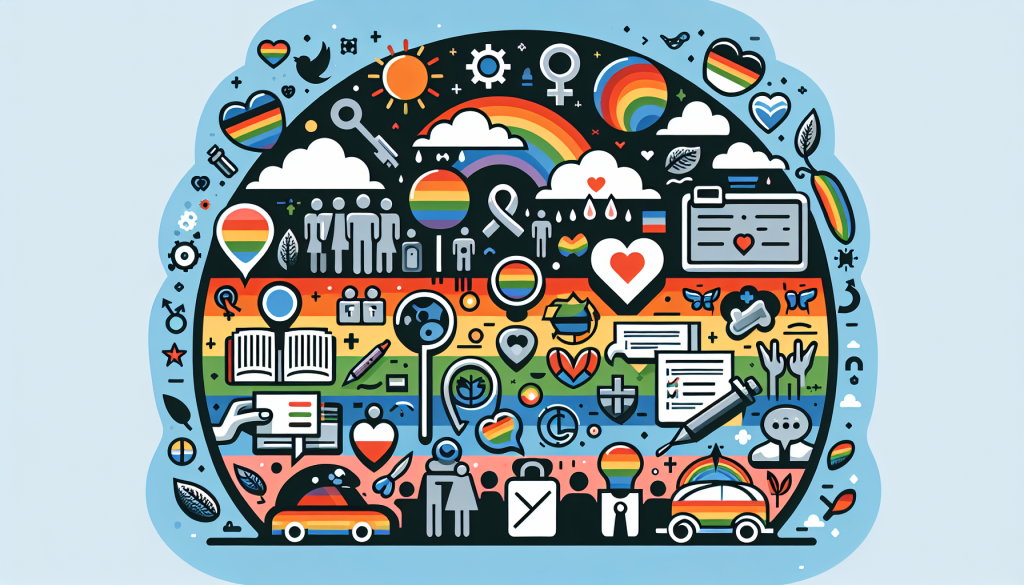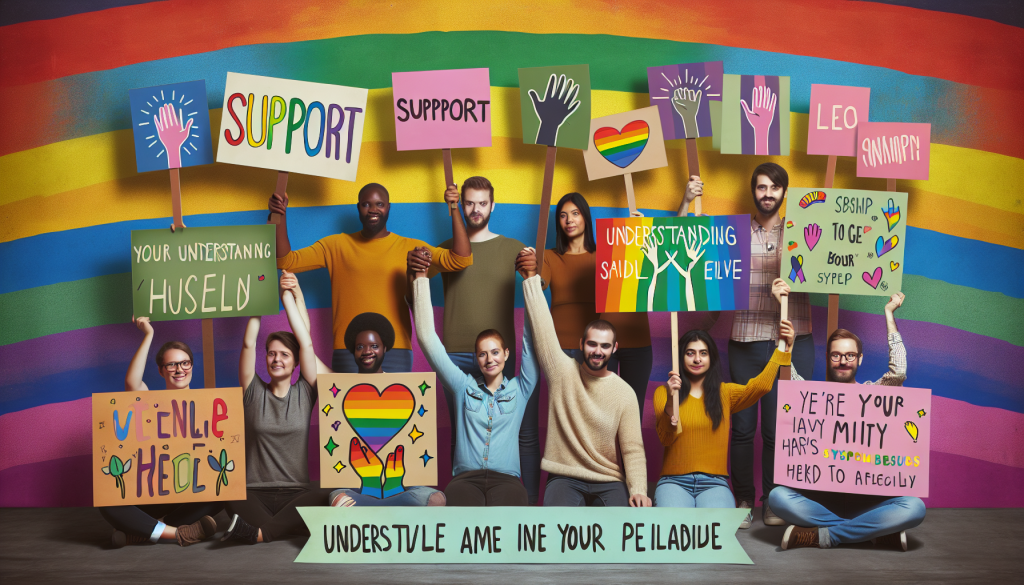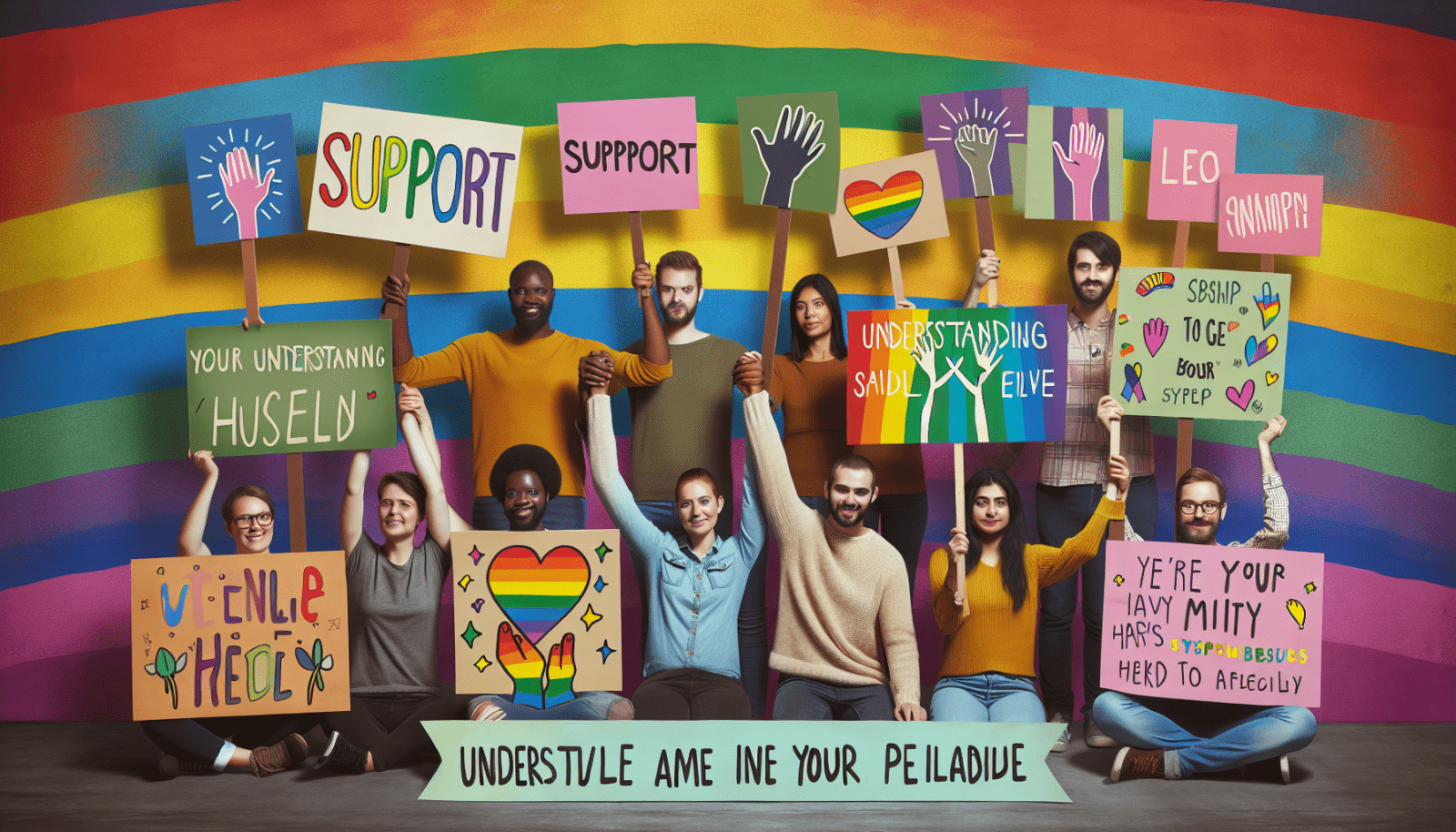In today’s society, it is crucial to address the mental health concerns within the LGBTQ+ community. As an individual, finding acceptance and support can be a challenging journey, and it is essential to understand and address the unique struggles faced by this community. This article explores the importance of addressing mental health in the LGBTQ+ community, shedding light on the factors that contribute to higher rates of mental health issues and the potential solutions that can create a more inclusive and supportive environment.

Understanding the LGBTQ+ Community
The LGBTQ+ community refers to individuals who identify as lesbian, gay, bisexual, transgender, and queer/questioning, as well as individuals with other sexual orientations or gender identities. This diverse community encompasses people from all walks of life, with varying experiences, backgrounds, and identities. Understanding this community is a crucial step towards promoting mental health and well-being for LGBTQ+ individuals.
Defining LGBTQ+
Lesbian refers to women who are attracted to other women; gay refers to men who are attracted to other men. Bisexual individuals are attracted to both men and women, while transgender individuals have a gender identity that differs from the sex assigned to them at birth. Queer/questioning individuals may be exploring their sexual orientation or gender identity, and may not conform to traditional categories. Additionally, the LGBTQ+ acronym is often expanded to include other sexual orientations and gender identities, such as pansexual and non-binary.
Demographics and Statistics
While accurate data on the LGBTQ+ population can be challenging to obtain due to issues of self-identification and disclosure, numerous studies have provided valuable insights into the demographics of this community. For instance, some studies suggest that approximately 4.5% of the United States population identifies as LGBTQ+. However, it is important to note that these estimates may vary depending on the research methodology used and the specific population being studied. Furthermore, diverse racial, ethnic, and socioeconomic backgrounds are represented within the LGBTQ+ community.
Unique Mental Health Challenges
LGBTQ+ individuals face unique mental health challenges due to factors such as stigma, discrimination, and the process of coming to terms with their sexual orientation or gender identity. These challenges can contribute to higher rates of mental health issues within the community. Understanding these challenges is crucial for providing effective mental health support to LGBTQ+ individuals.
Discrimination and Stigma
Prevalence of Discrimination
Discrimination against LGBTQ+ individuals remains a pervasive issue, despite advancements in LGBTQ+ rights and visibility. LGBTQ+ individuals often face discrimination in different aspects of their lives, including employment, housing, healthcare, and interpersonal relationships. Discrimination can manifest in explicit acts, such as hate crimes, but also in more subtle forms, such as microaggressions or systemic biases.
Impact on Mental Health
The discrimination and stigma faced by LGBTQ+ individuals can have a significant impact on their mental health. Constant exposure to discrimination can lead to increased levels of stress, anxiety, depression, and other mental health issues. LGBTQ+ individuals may also experience lower self-esteem, social isolation, and heightened vulnerability to mental health challenges.
Internalized Stigma
Internalized stigma refers to the negative beliefs and feelings individuals may internalize as a result of the discrimination they face. This can manifest as self-hatred, shame, or a sense of unworthiness. Internalized stigma can have profound effects on mental health, further exacerbating the challenges already faced by LGBTQ+ individuals.
Coming Out and Mental Health
Importance of Coming Out
Coming out, the process of disclosing one’s sexual orientation or gender identity, is a deeply personal and unique experience for each LGBTQ+ individual. Coming out can have positive impacts on mental health, as it allows individuals to embrace their authentic selves and form supportive connections within the LGBTQ+ community. It can also promote self-acceptance, reduce stress, and improve overall well-being.
Positive and Negative Experiences
Coming out experiences can vary widely. Some individuals may have positive and accepting reactions from family, friends, and communities, leading to increased social support and positive mental health outcomes. However, others may face rejection, hostility, or indifference, which can increase the risk of mental health issues such as depression, anxiety, and substance abuse.
Mental Health Consequences
Coming out can be a stressful experience, particularly if individuals anticipate negative reactions or fear losing important relationships. The potential mental health consequences include increased levels of stress, anxiety, and depression. It is crucial to provide support and resources to LGBTQ+ individuals during the coming out process to help mitigate these challenges and promote positive mental health outcomes.
Disparities in Mental Health Care
Barriers to Access
LGBTQ+ individuals often face unique barriers to accessing mental health care. These barriers may include limited availability of LGBTQ+ competent mental health providers in certain geographic areas, financial constraints, lack of health insurance coverage, or fear of discrimination within healthcare settings. These barriers can contribute to lower rates of mental health care utilization within the LGBTQ+ community.
Healthcare Provider Biases
Bias and discrimination from healthcare providers can further compound the barriers faced by LGBTQ+ individuals seeking mental health care. LGBTQ+ individuals may encounter healthcare professionals who lack knowledge about their specific needs, harbor negative attitudes, or engage in conversion therapy practices. This can create an unwelcoming and unsafe environment, leading to decreased trust and limited engagement with mental health services.
Negative Experiences in Healthcare Settings
Negative experiences within healthcare settings, such as receiving insensitive or uninformed care, can significantly impact the mental health and well-being of LGBTQ+ individuals. For example, disrespectful comments, misgendering, or being denied appropriate care can further contribute to feelings of stigma, isolation, and distress. LGBTQ+ individuals should have access to affirming and knowledgeable mental health providers who provide appropriate care and support.

Intersectionality and Mental Health
Multiple Marginalized Identities
Intersectionality recognizes that individuals may hold multiple marginalized identities that can influence their experiences, including race, ethnicity, socioeconomic status, and ability. LGBTQ+ individuals who hold multiple marginalized identities may face compounded discrimination and unique challenges in accessing mental healthcare, achieving positive mental health outcomes, and addressing their specific needs.
Cumulative Impact on Mental Health
The intersection of multiple marginalized identities can result in a cumulative impact on mental health. These individuals may face higher rates of discrimination, increased levels of stress, and compounded societal pressures. Understanding and addressing the intersectionality of LGBTQ+ identities can help mental health professionals provide more comprehensive and effective care.
Unique Experiences and Challenges
Intersectionality within the LGBTQ+ community highlights the need for tailored support and interventions that address the specific experiences and challenges faced by individuals with multiple marginalized identities. This can include considerations of cultural competency, understanding the impact of intersecting identities on mental health, and providing resources and support systems that address the unique needs of diverse individuals within the LGBTQ+ community.
Mental Health Issues in the LGBTQ+ Community
The LGBTQ+ community faces higher rates of certain mental health issues compared to the general population. These mental health concerns can be influenced by factors such as minority stress, discrimination, and the challenges specific to LGBTQ+ individuals.
Depression and Anxiety
Depression and anxiety are among the most prevalent mental health issues experienced by LGBTQ+ individuals. Constant exposure to discrimination, stigma, and societal pressures can contribute to increased rates of depressive and anxiety symptoms. It is essential to provide accessible mental health resources and support services to address these mental health concerns within the LGBTQ+ community.
Substance Abuse and Addiction
LGBTQ+ individuals are at an increased risk of substance abuse and addiction. This can be attributed to various factors, including the use of substances as coping mechanisms for discrimination and minority stress. It is crucial to address the underlying mental health issues and provide appropriate support and resources to combat substance abuse within the LGBTQ+ community.
Eating Disorders
Eating disorders disproportionately affect LGBTQ+ individuals, particularly bisexual women and individuals assigned female at birth. Societal beauty standards, discrimination, and internalized stigma contribute to heightened risk factors for developing eating disorders. It is important to provide inclusive and affirming treatment options that address the unique challenges faced by LGBTQ+ individuals in relation to body image and eating disorders.
Self-Harm and Suicide
LGBTQ+ individuals face higher rates of self-harm and suicide compared to the general population. The combination of discrimination, stigma, and mental health challenges places LGBTQ+ individuals at an increased risk. Providing accessible mental health support, crisis intervention services, and suicide prevention resources is crucial to address these alarming rates of self-harm and suicide within the LGBTQ+ community.
Supportive Resources and Organizations
LGBTQ+ Mental Health Services
There are numerous organizations and resources dedicated to promoting the mental health and well-being of LGBTQ+ individuals. These organizations offer specialized mental health services, support groups, and community resources tailored to the unique needs of LGBTQ+ individuals. Some examples include LGBTQ+ community centers, LGBTQ+ affirmative therapy providers, and LGBTQ+ specific mental health helplines.
Crisis Hotlines and Helplines
Crisis hotlines and helplines play a vital role in providing immediate support to LGBTQ+ individuals in times of crisis. These services provide a confidential and safe space for individuals who may be experiencing mental health issues, discrimination, or self-harm urges. Crisis hotlines and helplines often have trained professionals who can provide informed support and connect individuals with appropriate resources.
Online Support Communities
Online support communities offer LGBTQ+ individuals a space to connect, share experiences, and find support from others who may be facing similar challenges. These communities can provide a sense of belonging and understanding, which are particularly valuable for individuals who may be geographically isolated or facing limited in-person support options.
Advocacy and Awareness Organizations
Advocacy and awareness organizations at local, national, and international levels play a crucial role in promoting mental health and well-being in the LGBTQ+ community. These organizations work towards reducing stigma, discrimination, and barriers to mental healthcare. They also provide public education, advocate for policy changes, and raise awareness of LGBTQ+ mental health issues.
Promoting Mental Health Awareness
Education and Training
To address mental health disparities in the LGBTQ+ community, education and training are essential for mental health professionals, healthcare providers, and the general public. Cultural competency training and LGBTQ+ inclusive curricula can increase awareness, knowledge, and understanding of the unique mental health challenges faced by LGBTQ+ individuals. By fostering an environment of inclusivity and acceptance, we can work towards reducing discrimination and improving mental health outcomes.
Reducing Stigma and Discrimination
Challenging and reducing stigma and discrimination is fundamental to promoting mental health within the LGBTQ+ community. This can involve engaging in public awareness campaigns, promoting positive messaging, and advocating for LGBTQ+ rights and protections. Creating safe and inclusive spaces that celebrate diversity and actively reject discrimination can contribute to positive mental health environments for LGBTQ+ individuals.
Policy Changes and Legal Protections
Policy changes and legal protections are crucial in ensuring equitable access to mental health care for LGBTQ+ individuals. This includes laws that prohibit discrimination based on sexual orientation and gender identity, as well as policies that promote LGBTQ+ inclusive mental health services. Advocating for these changes at local, national, and international levels can help dismantle barriers faced by LGBTQ+ individuals in accessing mental health care.
Culturally Competent Mental Health Care
Creating Safe and Inclusive Environments
Culturally competent mental health care involves creating safe and inclusive environments where LGBTQ+ individuals feel valued, respected, and affirmed. This includes using inclusive language, displaying affirming signage and symbols, and establishing policies that prioritize LGBTQ+ rights and dignity. By fostering an atmosphere of acceptance, mental health professionals can create a space where LGBTQ+ individuals feel comfortable expressing their authentic selves and seeking support.
Affirmative and Supportive Therapy
Affirmative therapy is an approach that acknowledges and validates the diverse identities and experiences of LGBTQ+ individuals. It emphasizes a collaborative and empowering therapeutic relationship, focusing on the strengths and resilience of the individual. Supportive therapy can assist individuals in navigating the unique challenges they face and developing healthy coping strategies. Providing LGBTQ+-specific mental health services can promote positive mental health outcomes and improve overall well-being.
Addressing Unique Needs and Concerns
Mental health professionals need to address the unique needs and concerns of LGBTQ+ individuals when providing care. This may involve integrating LGBTQ+ cultural competency into assessment and treatment planning, considering the potential impact of discrimination and stigma on mental health, and being knowledgeable about LGBTQ+-specific resources and support networks. By tailoring care to the individual and their specific needs, mental health professionals can provide effective support for LGBTQ+ individuals.
Personal and Community Resilience
Building Resilience
Resilience refers to an individual’s ability to adapt and recover from adversity or stress. Building resilience among LGBTQ+ individuals involves fostering a sense of empowerment, self-acceptance, and social connectedness. Developing healthy coping mechanisms, creating supportive networks, and engaging in self-care practices can enhance resilience, promoting positive mental health outcomes.
Community Support and Connection
Community support and connection play a vital role in promoting mental health and well-being within the LGBTQ+ community. LGBTQ+ individuals benefit from forming connections with peers, allies, and support networks that celebrate their identities and provide a sense of belonging. Community organizations, events, and initiatives can help facilitate these connections and foster a sense of community and support.
Self-Care Strategies
Engaging in self-care strategies is essential for maintaining mental health and well-being. LGBTQ+ individuals can benefit from incorporating self-care practices into their daily lives, such as practicing mindfulness, engaging in activities they enjoy, seeking professional support when needed, and setting boundaries to prioritize their own well-being. By prioritizing self-care, individuals can better navigate the unique challenges they may face and promote positive mental health outcomes.
In summary, understanding the unique challenges and mental health issues faced by the LGBTQ+ community is crucial for promoting positive mental health outcomes. By addressing discrimination, stigma, and barriers to care, providing affirming mental health services, and fostering community support, we can work towards creating a more inclusive and supportive environment for LGBTQ+ individuals. It is essential to advocate for policy changes, reduce stigma and discrimination, and promote culturally competent mental health care to ensure the mental health and well-being of this diverse and resilient community.

